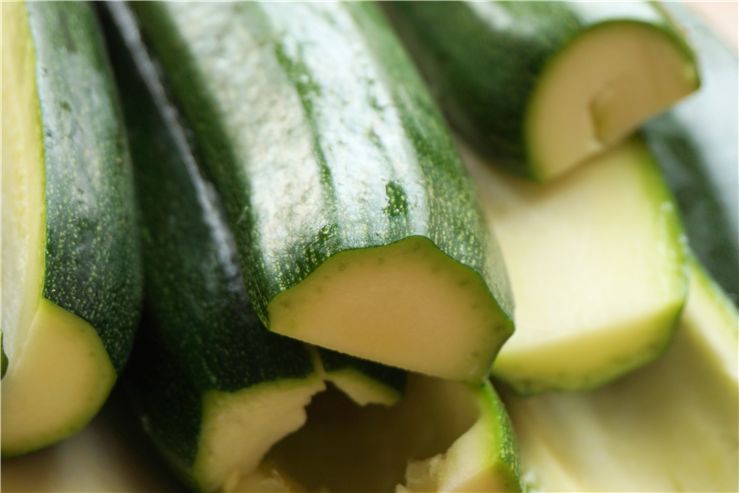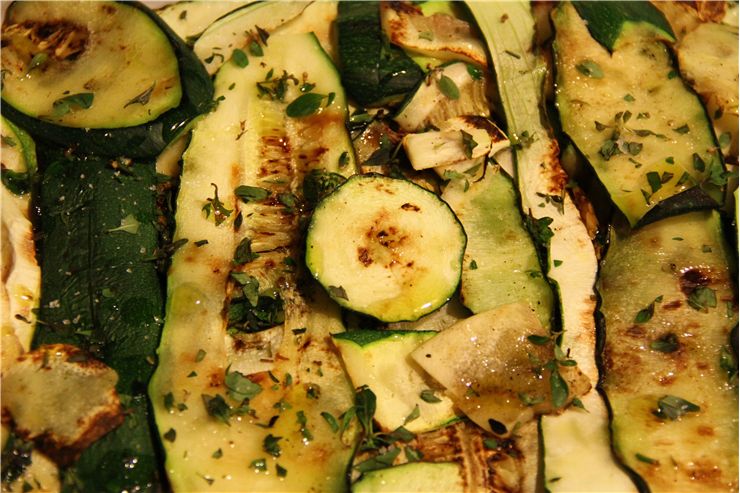Zucchini Nutrition Facts - Health Benefits of Zucchini
Zucchini (also known as courgette) is a type of squash. It can often grow up to a meter in length (or even more) but, because it is harvested while immature (so-called “summer squash”), those found on the market are often half that size. Zucchinis are fruits but are treated as a vegetable and are prepared cooked and presented as a savory dish or accompaniment.
Zucchini's origin is in Americas as all squash, and it was brought to Europe by the first explorers, but this particular variant developed in 19th century Italy and it spread from there. It was brought back to American in the early 1900s. Its name comes from Italian word “zucca” which means “pumpkin” and its diminutive “zucchino” or “zucchina.” They grow best in a warm, dry climate and can be grown on most soil types. Zucchini’s are ready for harvest after about eight weeks.

- 95% of zucchini mass is water.
- The largest zucchini in the world had around 33 kg and had 1.8 meters in length.
- Zucchini skin can be light green, dark green, dark yellow or orange.
- Flowers of zucchini can also be cooked and eaten. They can also be fried, stuffed, sautéed, baked, or used in soups.
- Seeds, if zucchini is harvested immature, are soft and edible.
- Zucchini themselves can be used raw, baked, boiled or fried. One more method of preparing them is baking them into a bread similar to banana bread. They can be prepared peeled or with skin.
- Smaller to medium zucchini are more sought after than larger ones because they have more flavor. They also have darker skin.
- Bought fresh zucchini can last up to a week if it is placed in a plastic bag and then in a refrigerator but it is best you use them in the first three days.
- There are even recipes for cakes that include zucchini as an ingredient.
- Zucchini is very low in fat (more precisely it has none), and is also cholesterol free. That makes it the perfect food for those that have trouble with excess weight and healthy food for all others. 100G of fresh zucchini has 15 calories.
- Among other ingredients, zucchini has manganese, vitamin C, vitamin A, magnesium, folate, potassium, copper, and phosphorus.
- Zucchini is high in fiber which helps digestion, prevents constipation and lowers the chance of colonic cancer. It also makes you feel satiated and with that makes you eat less. By making liver produce more bile acid from cholesterol, fiber from zucchini lowers the cholesterol in the body.
- Flavonoid poly-phenolic antioxidants like carotenes, lutein and zea-xanthin are high in zucchini. They fight free radicals which in turn speed up aging process in our bodies.
- Potassium lowers the blood pressure, keeps the heart healthy and with that prevents arteriosclerosis (damaging of blood vessels), heart attack, and stroke.
- Lutein and zeaxanthin, phytonutrients from the carotenoid family, help our eyesight by filtering the light rays as they enter our eyes and protecting the retina.
- Manganese supports the function of glycosyltransferases which are proteins that assist the development of bones. It also helps with body’s metabolism process of proteins and carbohydrates and helps in the production of sex hormones.
- Vitamin C, besides being an antioxidant, also aids in nerve cell communication, and helps the body metabolize cholesterol. It also prevents scurvy (because it is a vitamin C deficiency) which can have nasty symptoms from b ad skin to teeth falling out.
- Phytonutrients in zucchini also help in reducing the symptoms of benign prostatic hypertrophy.
- Zucchini’s Magnesium reduces the risk of heart attack and stroke. One cup of zucchini has 10% of recommended daily allowance of magnesium.
- Zucchini even has copper which helps reduce the pain of rheumatoid arthritis.

